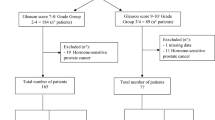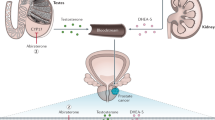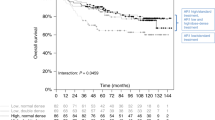Abstract
Background:
There is emerging data suggesting a potential risk for meningioma growth stimulation in patients on luteinizing hormone-releasing hormone (LHRH) analogs for prostate cancer. We examined the expression of LHRH receptor (LHRH-R), progesterone receptor (PR) and Ki67 labeling index (LI) in specimens from male meningioma (MM) and female meningioma (FM) patients.
Methods:
A total of 24 MM and 24 FM paraffin blocks were retrieved from our institution between 1991 and 2008. Sections from the paraffin blocks were stained with mouse monoclonal antibodies against LHRH-R, PR and Ki67. All male patients had no previous history of prostate cancer (PCa) or previous history of hormone therapy.
Results:
LHRH-R positivity was extensive in 92% of MM and 88% of FM samples, with both showing strong intensity (67% and 79%, respectively). PR was positive in 20 of 24 (83%) MM and 23 of 24 (96%) FM samples. MM is less likely to exhibit Ki67 LI >4% compared with FM.
Conclusions:
The majority of MM and FM samples were strongly positive for LHRH-R expression and PR expression. The emerging association of androgen deprivation therapy and meningioma growth should be recognized in urological practice. Caution should be taken when considering LHRH agonist administration for patients with PCa and concurrent meningioma or previous history of meningioma.
This is a preview of subscription content, access via your institution
Access options
Subscribe to this journal
Receive 4 print issues and online access
$259.00 per year
only $64.75 per issue
Buy this article
- Purchase on Springer Link
- Instant access to full article PDF
Prices may be subject to local taxes which are calculated during checkout

Similar content being viewed by others
References
Siegel R, Naishadham D, Jemal A . Cancer statistics, 2012. CA: Cancer J Clin 2012; 62: 10–29.
Schroder F, Crawford ED, Axcrona K, Payne H, Keane TE . Androgen deprivation therapy: past, present and future. BJU Intl 2012; 109 (Suppl 6): 1–12.
Lee KL, Terris MK . Luteinizing hormone-releasing hormone agonists and meningioma: a treatment dilemma. Urology 2003; 62: 351.
Gazzeri R, Galarza M, Gazzeri G . Growth of a meningioma in a transsexual patient after estrogen-progestin therapy. New Engl J Med 2007; 357: 2411–2412.
Bergoglio MT, Gomez-Balaguer M, Almonacid Folch E, Hurtado Murillo F, Hernandez-Mijares A . Symptomatic meningioma induced by cross-sex hormone treatment in a male-to-female transsexual. Endocrinol Nutr 2012; 60: 264–267.
Deipolyi AR, Han SJ, Parsa AT . Development of a symptomatic intracranial meningioma in a male-to-female transsexual after initiation of hormone therapy. J Clin Neurosci 2010; 17: 1324–1326.
Shimizu J, Matsumoto M, Yamazaki E, Yasue M . Spontaneous regression of an asymptomatic meningioma associated with discontinuation of progesterone agonist administration. Neurol Med-chirurg 2008; 48: 227–230.
Durmaz R, Deliorman S, Isiksoy S, Uyar R, Tel E . Luteinizing hormone releasing hormone increases proliferation of meningioma cells in vitro. Arc Physiol Biochem 1999; 107: 286–291.
Dolecek TA, Propp JM, Stroup NE, Kruchko C . CBTRUS statistical report: primary brain and central nervous system tumors diagnosed in the United States in 2005–2009. Neuro-oncology 2012; 14 (Suppl 5): v1–49.
Whittle IR, Smith C, Navoo P, Collie D . Meningiomas. Lancet 2004; 363: 1535–1543.
Wiemels J, Wrensch M, Claus EB . Epidemiology and etiology of meningioma. J Neuro-Oncol 2010; 99: 307–314.
Wigertz A, Lonn S, Hall P, Auvinen A, Christensen HC, Johansen C et al. Reproductive factors and risk of meningioma and glioma. Cancer Epidemiol Biomarkers Prev 2008; 17: 2663–2670.
Claus EB, Calvocoressi L, Bondy ML, Wrensch M, Wiemels JL, Schildkraut JM . Exogenous hormone use, reproductive factors and risk of intracranial meningioma in females. JNeurosur 2012; 118: 649–656.
Korhonen K, Auvinen A, Lyytinen H, Ylikorkala O, Pukkala E . A nationwide cohort study on the incidence of meningioma in women using postmenopausal hormone therapy in Finland. AmJ Epidemio 2012; 175: 309–314.
Cea-Soriano L, Blenk T, Wallander MA, Rodriguez LA . Hormonal therapies and meningioma: is there a link? Cancer Epidemiol 2012; 36: 198–205.
Fallanca F, Giovacchini G, Picchio M, Bettinardi V, Messa C, Fazio F . Incidental detection by [11C]choline PET/CT of meningiomas in prostate cancer patients. Quar J Nucl Med Mol Im 2009; 53: 417–421.
Leaes CG, Meurer RT, Coutinho LB, Ferreira NP, Pereira-Lima JF, da Costa Oliveira M . Immunohistochemical expression of aromatase and estrogen, androgen and progesterone receptors in normal and neoplastic human meningeal cells. Neuropathology 2010; 30: 44–49.
van Groeninghen JC, Kiesel L, Winkler D, Zwirner M . Effects of luteinisinghormone-releasing hormone on nervous-system tumours. Lancet 1998; 352: 372–373.
Hirota Y, Tachibana O, Uchiyama N, Hayashi Y, Nakada M, Kita D et al. Gonadotropin-releasing hormone (GnRH) and its receptor in human meningiomas. Clin Neurol Neurosurg 2009; 111: 127–133.
Limonta P, Manea M . Gonadotropin-releasing hormone receptors as molecular therapeutic targets in prostate cancer: current options and emerging strategies. Cancer Treat Rev 2013; 39: 647–663.
Yates C, Sharp S, Jones J, Topps D, Coleman M, Aneja R et al. LHRH-conjugated lytic peptides directly target prostate cancer cells. Biochem Pharmacol 2011; 81: 104–110.
Leuschner C, Enright FM, Gawronska-Kozak B, Hansel W . Human prostate cancer cells and xenografts are targeted and destroyed through luteinizing hormone releasing hormone receptors. Prostate 2003; 56: 239–249.
Hansel W, Leuschner C, Enright F . Conjugates of lytic peptides and LHRH or betaCG target and cause necrosis of prostate cancers and metastases. Mol Cell Endocrinol 2007; 269: 26–33.
Limonta P, Montagnani Marelli M, Mai S, Motta M, Martini L, Moretti RM . GnRH receptors in cancer: from cell biology to novel targeted therapeutic strategies. Endocr Rev 2012; 33: 784–811.
El Majdoubi M, Ramaswamy S, Sahu A, Plant TM . Effects of orchidectomy on levels of the mRNAs encoding gonadotropin-releasing hormone and other hypothalamic peptides in the adult male rhesus monkey (Macaca mulatta). J Neuroendocrinol 2000; 12: 167–176.
Spratt DP, Herbison AE . Regulation of preoptic area gonadotrophin-releasing hormone (GnRH) mRNA expression by gonadal steroids in the long-term gonadectomized male rat. Brain Res Mol Brain Res 1997; 47: 125–133.
Wilson TJ, Heth JA . Regression of a meningioma during paclitaxel and bevacizumab therapy for breast cancer. J Clin Neurosci 2012; 19: 468–469.
Acknowledgements
This study was funded by the Georgia Cancer Coalition.
Author information
Authors and Affiliations
Corresponding author
Ethics declarations
Competing interests
The authors declare no conflict of interest.
Rights and permissions
About this article
Cite this article
Li, Q., Coulson, H., Klaassen, Z. et al. Emerging association between androgen deprivation therapy and male meningioma: significant expression of luteinizing hormone-releasing hormone receptor in male meningioma. Prostate Cancer Prostatic Dis 16, 387–390 (2013). https://doi.org/10.1038/pcan.2013.45
Received:
Revised:
Accepted:
Published:
Issue Date:
DOI: https://doi.org/10.1038/pcan.2013.45
Keywords
This article is cited by
-
Hormone therapies in meningioma-where are we?
Journal of Neuro-Oncology (2023)
-
Expression of novel lhmlt fusion protein using plant viral vector and study of its anticancer effect
Plant Cell, Tissue and Organ Culture (PCTOC) (2020)
-
Spontaneous regression of meningiomas after interruption of nomegestrol acetate: a series of three patients
Acta Neurochirurgica (2019)
-
Case Report. Progressie van meningeoom gedurende hormoontherapie bij prostaatcarcinoom
Tijdschrift voor Urologie (2016)
-
An integrative view on sex differences in brain tumors
Cellular and Molecular Life Sciences (2015)



